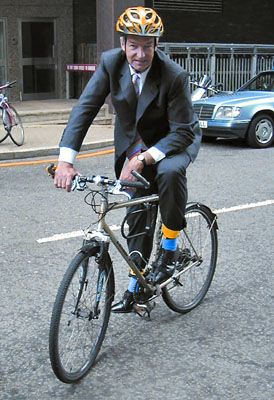Jon Snow’s manifesto for safer cycling
Who protects the human rights of cyclists? Writing here and in The Times following the serious injury of journalist Mary Bowers, Channel 4 News Presenter Jon Snow calls for urgent action.

The UK has never needed the bike more. Obese, austerity stricken, and polluting, urban Britain is indeed responding to that need by taking to cycling. I have been using a bike to, from, and whilst at work for 40 years.
I can even claim to be a better journalist for cycling. Not only do I get to stories and interviews faster, but the very experience of being treated as a fifth-class citizen gives me a perspective that has long since knocked any sense of self importance squarely on the head.
Where even 10 years ago I might see five or six other cyclists during my journey to and from work, today I see 50 or 60. Yet the physical conditions in which I cycle have remained virtually unchanged.
Unapologetic daubs of green or blue paint, with white lines, posing menacingly as “cycle ways” have sprouted everywhere, often ending in nowhere. One parked vehicle, throws the cyclist straight out into the highway rush.
Reading the devastating account of Mary Bowers’ accident in Thursday’s Times has left me all too conscious of a sense of “there but for the grace of God”.
Virtually every urban cycling day, something happens that takes me to within a second or two, or even an inch or two of danger.
Virtually every urban cycling day, something happens that takes me to within a second or two, or even an inch or two of danger. Yes, cycling is an exhilarating, efficient, body-enhancing, environmentally-friendly experience. But as Mary’s traumatic coma must daily remind us, it is also an actively threatening experience too.
Government appears to be in confusion about cycling. On the one hand bikes take tens of thousands of vehicle journeys off the road; cycling is assaulting obesity; and it is rendering the pedalling work force efficient in its journey to and from the workplace. These are tangible targets of government policy – fighting the fat that hospitalises so vast a segment of our population, and battling climate change by reducing emissions to zero.
But as The Times pointed out on Friday, road safety, protecting the motorist, and failing to pro-actively to respond to the huge uptake in urban cycling appears to show government going in precisely the opposite direction.
The Times Cycling Manifesto is as good as far as it goes, but there is a serious dimension missing – that of human rights. Cyclists are in a fine position to observe what’s going on our roads. The dominant creature on the urban road is the single-occupancy car. One person in motorised 60 square foot metal box.
And what are we? One person on a thin strip of mineral with two wheels. One has the power, the presence, and the rights; the other is deprived of all three. Is that equality under the law?
I write as an objective journalist, not as a cycling fanatic. I write as a father, a brother, an uncle, and a friend of people who want to join me on the road.
I would willingly pay a license fee to cycle if it introduced me into the world of road rights in which separated cycle ways were provided as my right. My children were deprived of the right to cycle to school, even of the right to cycle safely at university – it was, and is quite simply too dangerous.
Cars and bikes do not mix organically. It’s not just the fumes that incidentally compel me to wear a mask, but the obvious reality that so consumed Mary Bower’s well-being and consciousness. It is the absolute fact that half a tonne of vehicle, and 80kgs of bike and human simply cannot co-exist in the same road space safely.
So to the element we cyclists do not like to discuss. This deprivation of rights has us taking the law into our own hands. We check for traffic and pedestrians at red and all too often make a run for it to get ahead of the menacing machinery behind. We are careless of the pedestrian, and there’s not even much camaraderie between us as cyclists until the worst happens and we crowd around and say our “oh dears”.
More from Channel 4 News: Why are more cyclists dying on Britain's roads?
The Times is right. Things MUST change. In London, the “Boris bikes” have helped swell the already surging thirst to cycle. Other cities will follow. Mass is at least forcing our presence upon the road. But it is not a right.
I write as an objective journalist, not as a cycling fanatic. I write as a father, a brother, an uncle, and a friend of people who want to join me on the road. I will encourage none of them. They must make their own choice, as Mary Bower did. But that choice can no longer be allowed to condemn any one of us to the agony and deprivation to which Mary and her family are now subjected.
A version of this article also appears in The Times on Saturday 4 February.
-
Latest news
-
Boy with profound learning disabilities reaches out of court settlement after abuse in residential school7m

-
India election: Modi rivals hit by string of raids and arrests7m

-
Can UK’s abandoned mines be used to build a greener future?5m

-
Sycamore Gap: Man pleads not guilty to felling iconic tree2m

-
‘Child poverty has not fallen since Tories came in’, says Gordon Brown5m

-





